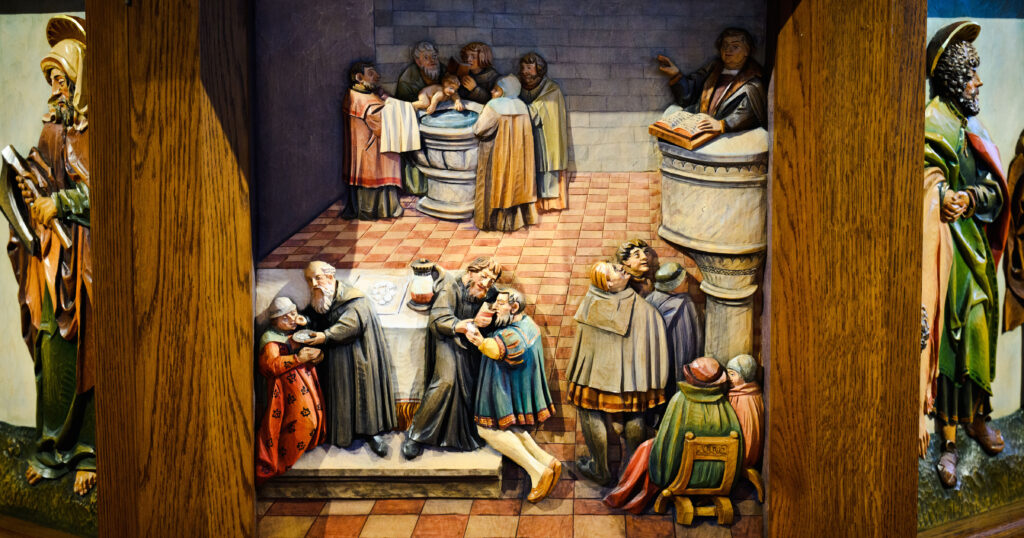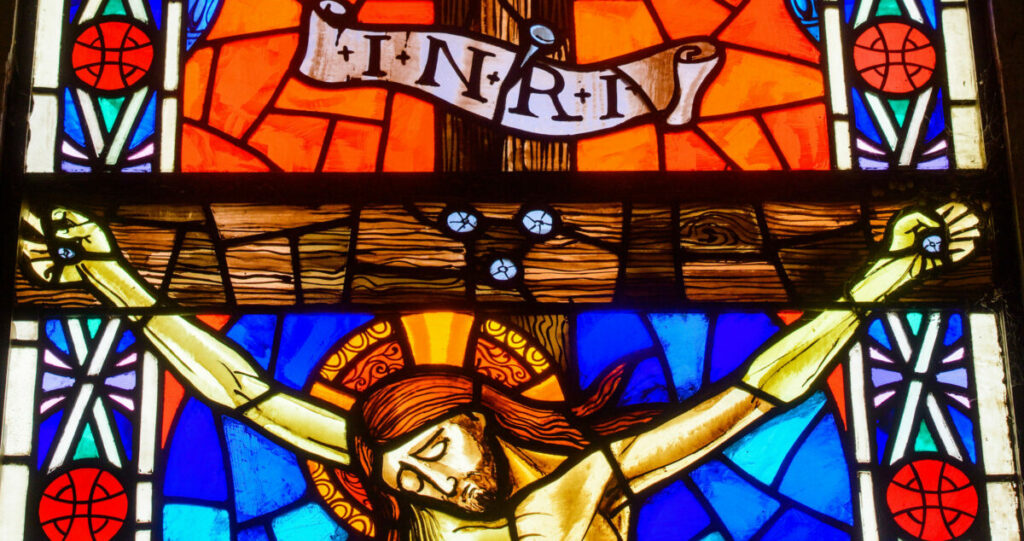The October 2025 issue of The Lutheran Witness provided definitions and explanations of nine different words we use often as Lutherans — and unpacked how other denominations use those terms differently. We are sharing several of these online throughout the month of October.
Definition:
Grace is God’s undeserved, free gift of mercy and forgiveness to sinners, by which He declares them righteous solely on account of the works and merit of Christ.
Lutherans Confess:
Since the fall into sin, human beings have had a big problem. We are by virtue of our corrupted nature enemies of God, who cannot submit to His Law (Rom. 8:7–8). We have neither the desire nor the power to turn to God and befriend Him (Ap IV 27, 40). We cannot make ourselves righteous in God’s eyes and do not even seek Him (Rom. 3:10–18; AC II 1). Since our God is holy and can accept only those who are righteous, this means that, left to ourselves, we deserve only eternal punishment. Dead in our trespasses (Eph. 2:1–3), we can do nothing without Christ (John 15:5). Thankfully, we have a God who is gracious (Ex. 34:6).
“Grace” refers to the favor of God shown to those who cannot merit it. Particularly, we use this term to refer to God’s love shown to sinners. The concept of grace requires a recipient who is undeserving or who has great need. As Romans 11:6 makes clear, if any of our works were the cause of God’s favor, “grace would no longer be grace.”
Because we are unable to stand before God ourselves, His unmerited grace is necessary to our relationship with Him. Our righteousness is entirely a free gift (Rom. 3:24–25), received through faith (Rom. 3:28). Thus when Lutherans talk about “grace,” we are referring entirely to a quality of God resultant in action to our benefit — not about a power from God by which we humans do anything, as some denominations use the term.
Grace is an attribute of God — but God’s grace is most centrally manifest to us in His mighty action of adopting His prodigal children purely out of His unconditional, unmerited love (Eph. 2:4–7). God loves us and has acted decisively in Christ to save us from our sins and reconcile us to Himself. God freely chose to send His Son to become man, and Jesus Christ lived under the Law and kept it perfectly, so that now, we can be adopted as God’s sons (Gal. 4:4–5). Christ also took upon Himself the sins of the world and through His death on the cross made full atonement for them (Heb. 9:11–14; 1 John 2:2). The object of God’s grace is the entire world: Christ’s ransom is for all people (2 Cor. 5:14–15; 1 Tim. 2:6; Titus 2:11), and He wants everyone to be saved (1 Tim. 2:4). However, though no one has the power to choose God, some choose to reject God’s grace (Luke 13:34; Acts 7:51; 1 Tim. 1:19).
While God does predestine those He saves, He does not predestine anyone to hell. The fault for damnation remains with the sinner who, out of pride and self-will, rejects God’s grace. Why some resist God’s grace and others do not is ultimately a mystery we do not understand, because God’s Word is silent on the matter. But Scripture clearly teaches that Christians are saved by grace alone (sola gratia), and this is why Lutherans believe, teach and confess this doctrine. It is a great comfort that our salvation depends on God’s grace alone, for if it depended on our works, we could never have assurance of salvation.
Lutherans also insist that God offers His grace to us through means He has ordained — which we refer to as “Means of Grace,” Word and Sacrament. Rather than looking for His salvation outside of these means, we look to receive from our God in these places where He has promised to come to us with life and salvation. Sometimes in Scripture, the term “grace” is used to refer to a gift given by God to man to steward (1 Peter 4:10) — however, this grace in man is a result of divine grace, not a quality inherent in man, and it is not a cause of man’s righteousness before God.
Unpacking Other Definitions:
- Infused grace: Roman Catholic doctrine affirms God’s grace but claims that instead of our being declared righteous solely on the basis of Christ’s merits, we are “infused” with grace, which enables us to fulfill the demands of righteousness. This teaching implies that humans contribute something to their salvation by their action of cooperating with God’s infused grace — thus we are not saved by grace alone. St. Paul is clear that if our works contributed anything to our salvation, “grace would no longer be grace” (Rom. 11:6; Ap IV 41).
- Irresistible grace: Calvinists, who believe in man’s “total depravity,” confess that we are unable to turn toward God or cooperate in our salvation. However, Calvinism differs from Lutheranism on both the nature of God’s gracious offer of salvation and the ability of human beings to reject that offer. Calvinists teach a sort of divine determinism, according to which God alone determines, from eternity, who is saved and who is damned. This is known as “double predestination.” This teaching requires the concept of “irresistible grace”: that God’s grace cannot be rejected by those to whom He chooses to offer it. They also teach that God’s grace was never offered to the damned, in contradiction of Scripture’s teaching that Christ’s atoning sacrifice is sufficient to pay for all mankind’s sins (Heb. 9:26; 10:12) and that Christ offers His righteousness to all people (Titus 2:11).
- Immediate grace: Some Baptists and many nondenominational Evangelicals teach that God’s grace is something that we do not only have the power to reject, but also to accept. This “decision theology” turns grace into merely God’s offer, rather than His free, unmerited gift. Evangelicals also typically teach that grace operates apart from the means of Word and Sacrament. According to this idea of “immediate grace,” we can expect the Holy Spirit to work on us directly in order to create faith. This view is rejected by Lutherans: “God does not want to deal with us in any other way than through the spoken Word and the Sacraments” (SA III VIII 10). These Means of Grace enable us to distinguish the Holy Spirit from an evil spirit (1 John 4:1–6; SA III VIII 11).
From Scripture:
“For if, because of one man’s trespass, death reigned through that one man, much more will those who receive the abundance of grace and the free gift of righteousness reign in life through the one man Jesus Christ” (Rom. 5:17).
From Our Confessions:
“The person who knows that he has a Father who is gracious to him through Christ truly knows God” (AC XX 24).





